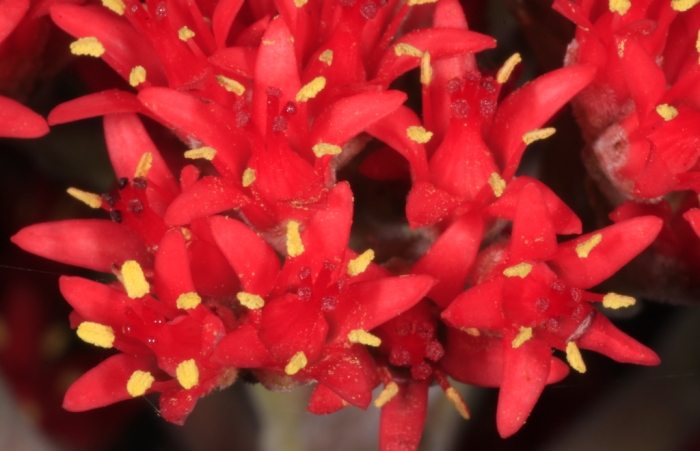Airplane Plant
(Crassula perfoliata)
Airplane Plant (Crassula perfoliata)
/
/

Derek Keats
CC BY 2.0
Image By:
Derek Keats
Recorded By:
Copyright:
CC BY 2.0
Copyright Notice:
Photo by: Derek Keats | License Type: CC BY 2.0 | License URL: https://creativecommons.org/licenses/by-sa/2.0/ | Uploader: Derek Keats | Publisher: Flickr |













Estimated Native Range
Summary
Crassula perfoliata, commonly known as Airplane Plant or Propeller Plant, is an evergreen succulent native to the arid inland areas of the Eastern Cape Province in South Africa. It is characterized by its unique propeller-like leaf arrangement, with thick, fleshy leaves that are gray-green in color. This plant typically grows to a height of 18-24 inches (45-60 cm) and spreads out to 24-30 inches (60-75 cm). The leaves are often edged with a reddish tint, especially when grown in bright light. During the summer, it produces clusters of small, star-shaped red flowers at the end of its branches, which are quite showy and attract pollinators such as bees and butterflies.
The Airplane Plant is appreciated for its distinctive foliage and architectural form, making it a popular choice for rock gardens, succulent collections, and as a container plant. It is also used in xeriscaping due to its low water requirements. In cultivation, it thrives in full sun to partial shade and requires very little maintenance. It is best grown in well-draining soil, and overwatering should be avoided to prevent root rot. While it is generally pest-resistant, mealybugs and scale insects can occasionally be a problem. It is not frost-tolerant and should be protected from freezing temperatures. Propagation is easily done by leaf cuttings or offsets.CC BY-SA 4.0
The Airplane Plant is appreciated for its distinctive foliage and architectural form, making it a popular choice for rock gardens, succulent collections, and as a container plant. It is also used in xeriscaping due to its low water requirements. In cultivation, it thrives in full sun to partial shade and requires very little maintenance. It is best grown in well-draining soil, and overwatering should be avoided to prevent root rot. While it is generally pest-resistant, mealybugs and scale insects can occasionally be a problem. It is not frost-tolerant and should be protected from freezing temperatures. Propagation is easily done by leaf cuttings or offsets.CC BY-SA 4.0
Plant Description
- Plant Type: Succulent
- Height: 2-4 feet
- Width: 0.15-0.3 feet
- Growth Rate: Moderate
- Flower Color: Red
- Flowering Season: Summer
- Leaf Retention: Evergreen
Growth Requirements
- Sun: Full Sun
- Water: Very Low, Low
- Drainage: Fast
Common Uses
Bee Garden, Bird Garden, Butterfly Garden, Deer Resistant, Drought Tolerant, Fire Resistant, Fragrant, Low Maintenance, Rock Garden, Showy Flowers, Street Planting
Natural Habitat
Arid inland areas of the Eastern Cape Province in South Africa
Other Names
Common Names:
Scientific Names: , Crassula perfoliata, Crassula perfoliata var. perfoliata, Crassula perfoliata var. albiflora, Crassula pallida, Rochea perfoliata, Crassula falax, Larochea perfoliata, Larochea perfoliata var. alba, Rochea falcata var. acuminata
GBIF Accepted Name: Crassula perfoliata L.